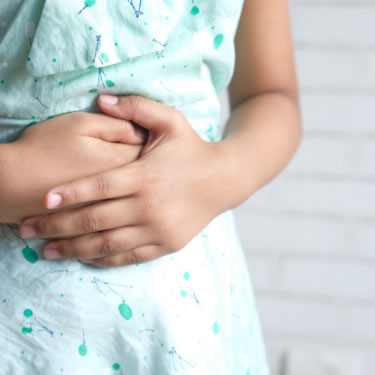 Constipation is a common problem in children. It is estimated 1 in 3 children will experience constipation during their childhood. The peak incidence is at the time of toilet training around 2-3 years of age. Children with constipation often have infrequent bowel movement (less than 3 times a week). The stools are either abnormally large or small in size like rabbit droppings and they tend to be hard and dry. These children often experience anorectal pain during defaecation, which leads to deliberate stool withholding. This prolonged period of stool retention increases the size and hardness of stools making them harder to pass. This eventually leads to development of megarectum, devoid of defaecation sensation and subsequent soiling. These children are often worried and quiet, have low self-esteem, experience bullying and being excluded from their peers. Lack of appetite, abdominal bloating and nausea are common findings.
Constipation is a common problem in children. It is estimated 1 in 3 children will experience constipation during their childhood. The peak incidence is at the time of toilet training around 2-3 years of age. Children with constipation often have infrequent bowel movement (less than 3 times a week). The stools are either abnormally large or small in size like rabbit droppings and they tend to be hard and dry. These children often experience anorectal pain during defaecation, which leads to deliberate stool withholding. This prolonged period of stool retention increases the size and hardness of stools making them harder to pass. This eventually leads to development of megarectum, devoid of defaecation sensation and subsequent soiling. These children are often worried and quiet, have low self-esteem, experience bullying and being excluded from their peers. Lack of appetite, abdominal bloating and nausea are common findings.
Paediatric Gut Investigation Clinic are pleased to offer constipation treatment to children at our clinics in West Sussex, Surrey, and Wimbledon in London. Book your appointment here. We have also put together a treatment package which most parents find helpful
Functional or idiopathic constipation (in the absence of an organic cause) is by far the commonest cause of constipation. There are organic causes for child constipation such as hypothyroidism, Hirschsprung’s disease, coeliac disease, food allergy, connective tissue disorder (Ehler-Danlos Syndrome), reduced fluid intake, anorexia nervosa, narcotic usage and hypocalcaemia. These causes account for <10 % of all cases.
NICE published a guideline for managing constipation in childhood in 2010, and it was revised in June 2015 based on the best evidence strategy for children with constipation in primary and secondary care settings. The goal of the treatment is for the child to pass a good amount of stools with relative frequency (3-5 stools per week) and normal consistency without soiling and excessive straining. Children with simple constipation can be managed successfully with low-dose osmotic laxatives and a high-fluid and fibrous diet. On the other hand, children with refractory constipation often need escalation of laxatives (combination of stool softeners and stimulants), managed by paediatricians and gastroenterologists. Faecal disimpaction by using Polyethylene Glycol (PEG) is often required. Rectal enema and surgical evacuation may be required in extreme cases. Parents should be warned that soiling may get worse during the initial phase of faecal disimpaction.
Parental and patient education is essential. An explanation of the physiological basis of constipation and soiling provides a better understanding of the process of child constipation. Parents often have mistaken soiling for diarrhoea. They are often reluctant to give laxatives to their children for fear of them becoming dependent on laxatives. Reassurance of parents that laxatives are safe and adverse side effects are rare is important. Parents must also be aware that non-punitive behaviour interventions and rewards are desirable for positive outcomes. Sudden cessation of laxative treatment should be avoided as it often leads to a relapse of constipation.
Food allergy-induced constipation (mainly cow’s milk and wheat allergy) is increasingly recognised as a cause of child constipation. Excluding these from their diet often leads to improved bowel movement and subsequent successful weaning of laxatives.
Primary care physicians tend to undertreat children with constipation. Recent evidence has suggested that early adequate therapeutic intervention was more likely to be beneficial and contributed to successful outcomes of constipation. In general, 50% of children with chronic constipation will be cured after a year and 65-70% after 2 years, particularly in motivated, compliant families.
Our private clinic in Charlwood is perfectly located to see patients from all nearby areas, including Chichester, Banstead, Dorking, Epsom, Guildford, Redhill, Southampton, Portsmouth, Royal Tunbridge Wells, Maidstone, and Epsom. We also have private clinics based in Surrey and Wimbledon, London.
